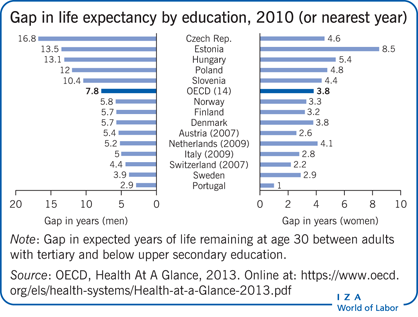Elevator pitch
A statistical association between more education and better health outcomes has long been observed, but in the absence of experimental data researchers have struggled to find a causal effect. Schooling reforms such as raising school leaving age, which have been enacted in many countries, can be viewed as a form of natural experiment and provide a possible method of identifying such an effect. However, the balance of evidence so far is that these reforms have had little impact on long-term health. Thus, policymakers should be cautious before anticipating a health effect when introducing reforms of this nature.

Key findings
Pros
Compulsory schooling reforms provide opportunities to measure the causal links between education and health outcomes such as reduced mortality and morbidity.
Some studies suggest that schooling reforms have provided additional health benefits in some cases.
Early research using country-level variation in the introduction of compulsory schooling laws shows a causal effect from education to health, possibly arising from delaying engagement in hard physical labor.
There is evidence of an effect of compulsory schooling reforms on cognitive functioning, which may be reflected in reduced incidence of dementia.
Cons
More sophisticated research designs with better quality data suggest no causal link from schooling reforms to health.
The conditions required to achieve health benefits from compulsory schooling reforms may no longer be present in most developed countries.
If compliance with the reform is weak, then only modest health effects can be expected.
The impact of reforms appears to be local and context specific, which delimits the generalizability of any observed effects.
Existing evidence is ambiguous enough that it cannot be assumed that educational reforms will have positive health effects.